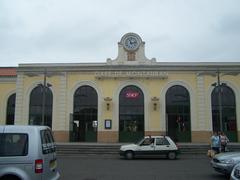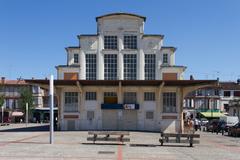Visiting Collège des Jésuites de Montauban: In-Depth Guide to History, Visiting Hours, Tickets & Nearby Attractions
Date: 14/06/2025
Introduction
Set in the heart of Montauban, the Collège des Jésuites is one of southern France’s most significant and evocative heritage sites. Its centuries-old pink brick facades and twin towers are not just architectural landmarks—they are silent witnesses to Montauban’s religious, educational, and civic evolution. Founded in the 17th century during the Catholic Counter-Reformation, the Collège has served as a Jesuit school, royal and municipal college, revolutionary foundry, pioneering girls’ lycée, and, today, a vibrant center for culture and learning (iKEROS; Centre du Patrimoine Montauban).
This comprehensive guide provides everything you need to plan your visit: historical context, architectural highlights, practical information on opening hours and tickets, accessibility details, tour options, and the best ways to explore nearby Montauban historical sites.
Historical Overview
Jesuit Foundation and Early Growth
The Collège des Jésuites was established in the late 17th century, a product of the Catholic Church’s efforts to reassert influence in a region with a strong Protestant presence. The Jesuits acquired and adapted existing 16th-century structures, transforming them into a prestigious institution renowned for its rigorous curriculum and Baroque architecture. Notable features include the chapel rededicated to Saint Ignatius of Loyola, exquisite interior decorations by Jesuit artists, and the emblematic bell tower (“campanile à la toulousaine”) designed by Antoine Chassagnard in 1676 (iKEROS; POP Culture).
Expansion, Suppression, and Transformation
By 1701, the Collège served around 300 students, including some Protestants—a testament to its influence despite ongoing religious tensions. The revocation of the Edict of Nantes in 1685 triggered further expansion, with the addition of new wings and facilities, including a declamation hall and gardens (POP Culture).
The Jesuit expulsion in 1763 and the upheavals of the French Revolution led to the Collège’s closure, secularization, and repurposing as a cannon foundry. In the 19th century, it was reborn as a municipal college, then as a boys’ lycée under the Second Empire. The Sée Law of 1882 inaugurated a new era, transforming the Collège into a pioneering center for girls’ secondary education (POP Culture).
Preservation and Modern Role
Threatened with demolition in the 1970s, the Collège was saved through community action and officially protected as a historic monument in 1972. Since the 2000s, it has housed the Centre d’Interprétation de l’Architecture et du Patrimoine (CIAP), Montauban’s main library (Médiathèque Mémo), and serves as a hub for cultural events, exhibitions, and community life (Montauban Tourisme; Médiathèque Mémo).
Architectural Highlights
- Materials & Style: Built in the city’s iconic pink brick, the Collège is a harmonious example of Jesuit architecture, blending Baroque influences with local traditions (Navaway).
- Layout: The main building, flanked by two towers, encloses a rectangular courtyard. A dramatic grand staircase and vaulted interiors provide a sense of grandeur (POP Culture).
- Adaptive Reuse: Modern renovations have integrated glass-walled reading rooms, exhibition spaces, and accessibility features without compromising historic character (ArchDaily – Mémo Library).
Visiting Information
Opening Hours
-
Médiathèque Mémo (library) & CIAP:
- Tuesday to Saturday: 10:00 AM–6:00 PM
- Sunday: 2:00 PM–6:00 PM (check for seasonal variations)
- Closed Mondays and public holidays
-
Special Events/Exhibitions: Some events may have extended or different hours—always consult the official websites for up-to-date information.
Tickets & Admission
- General Admission: Free to public areas, CIAP exhibitions, and library spaces
- Special Events/Guided Tours: Some exhibitions and group tours require tickets (€3–€8), with discounts for students, children, and seniors
- Booking: Guided tours can be booked via the Montauban Tourist Office
Accessibility
- Wheelchair accessible with elevators and ramps
- Contact CIAP or Médiathèque Mémo for specific needs or assistance (Journées du Patrimoine)
Visitor Facilities
- Restrooms & Cloakroom: Modern facilities available
- Wi-Fi: Free Wi-Fi in the CIAP and library areas
- Café & Terrace: On-site café and outdoor seating
- Gift Shop: Local books and souvenirs
- Family-Friendly: Kids’ spaces, workshops, and events
Guided Tours & Interpretation
- Languages: French; English tours/materials available on request
- Duration: 60–90 minutes covering history, architecture, and cultural significance
- Self-Guided Options: Digital audio tours via Wivisites app or printed guides
Events & Seasonal Highlights
- Annual Festivals: Printemps des Poètes, European Heritage Days, art fairs
- Workshops & Lectures: Regular programming for all ages
- Permanent Exhibition: “Portrait d’une ville” on Montauban’s urban history
Check current events via the Centre du Patrimoine’s events page or Ville de Montauban – Agenda.
Nearby Attractions & Suggested Itinerary
- Place Nationale: Iconic arcaded square for food, coffee, and people-watching
- Musée Ingres Bourdelle: Fine arts and sculpture museum, 5-minute walk
- Saint-Jacques Church & Pont Vieux: Historic church and medieval bridge
- Heritage Trails: Self-guided routes via the Wivisites app
Travel Tips
- Getting There: SNCF trains to Montauban-Ville-Bourbon, city buses, nearby parking (Parking du Coeur de Ville, Place Prax Paris)
- Best Times to Visit: Weekdays outside school holidays are quieter; spring and autumn offer pleasant weather
- Accessibility: The historic core is pedestrian-friendly; some upper floors may be stair-access only—confirm in advance for full accessibility
- Photography: Non-flash permitted in most areas; check rules for temporary exhibits
- Family Visits: Interactive exhibits, children’s workshops, stroller access limited in some spaces
Frequently Asked Questions (FAQ)
Q: What are the visiting hours?
A: Tuesday–Saturday 10:00–18:00; Sunday 14:00–18:00; closed Mondays and holidays
Q: Is admission free?
A: General admission is free; select events/tours require tickets
Q: Are guided tours available?
A: Yes, book via the Tourist Office; English available on request
Q: Is the site wheelchair accessible?
A: Yes; elevators and ramps in main areas
Q: Can I take photos?
A: Yes, non-flash in most areas; restrictions apply for some exhibitions
Contact & Practical Information
- Address: Place du Coq, 82000 Montauban, France
- Phone: +33 (0)5 63 63 03 50 (CIAP)
- Email: [email protected]
- Websites:
Conclusion
The Collège des Jésuites de Montauban is much more than a relic of the past; it is a living, evolving center of education, culture, and community. Whether you are drawn by its elegant architecture, layered history, or vibrant programming, a visit here immerses you in the very fabric of Montauban’s identity. Plan your visit, explore nearby historical treasures, and make the Collège a highlight of your journey through Occitanie.
Stay up to date on events and exhibitions via the official tourism website, and enhance your experience with interactive tours from the Audiala App.
References and Official Resources
- iKEROS
- POP Culture
- Centre du Patrimoine Montauban
- Montauban Tourisme
- Médiathèque Mémo
- Guide Tourisme France
- ArchDaily – Mémo Library
- Ville de Montauban – Agenda
- Audiala App


